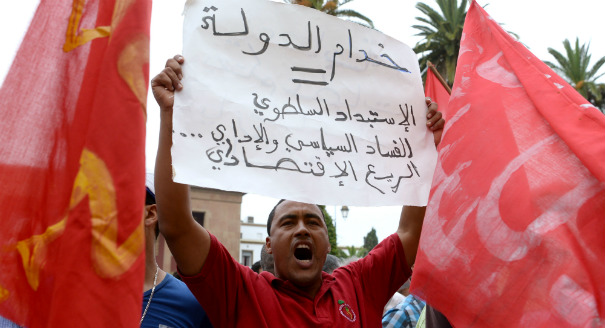As Morocco’s parliamentary elections approach on October 7, tensions between the Islamist-led government and its opponents are rising. Competition between factions is devolving into partisan fighting, particularly between the Justice and Development Party (PJD) and the Party of Authenticity and Modernity (PAM). This tension—aided by a series of leaks, accusations, and insinuations—has dominated political interaction and played out in the national press, culminating in a march of an estimated 7,000 to 9,000 protesters against Prime Minister Abdelilah Benkirane and his party on September 18. The PJD is unofficially accusing the PAM and Ministry of the Interior of organizing the march, an allegation they both vehemently deny.
The series of leaks and revelations began this summer. On July 2, 2016, an Italian ship arrived carrying 2,500 tons of waste to the central Jorf Lasfar seaport, whereupon Moroccans discovered that the Ministry of the Environment, as per previous contracts, had agreed to accept 5.5 percent of Italy’s annual waste. This incited public uproar around allegations that the materials it contained—to be incinerated in Morocco—were toxic. Minister of Environment Hakima El Haite explained, to no avail, that the shipment included treated plastic, rubber, and used tires, and was neither toxic nor hazardous. She further explained that in the absence of adequate infrastructure to recycle local waste, Morocco imports 450,000 tons of foreign waste annually for energy generation. El Haite, representing the Popular Movement Party in the Islamist-led ruling coalition, faced a storm of public criticism and calls for her resignation. She accused unnamed government adversaries of publicizing information about the Italian waste at an inopportune moment, tarnishing Morocco’s image ahead of the COP22 climate change summit it is hosting in November. In response to pressure from civil society, the government axed the deal with Italy and banned future waste imports.
Furthermore, on July 25, a leaked list disclosed the names of “civil servants” who had bought between 65 and 70 land plots in the Zaer area of Rabat at prices far below market value. The benefiting officials, including royal advisors, ministers, governors, and prominent politicians from different parties, paid 350-370 Moroccan dirhams ($36-38) per square meter, instead of its official value of around 4,500 dirhams ($465), as determined by the general tax administration. Yet amid the public uproar around the scandal, the Rabat urban agency rushed to shut down online access to records of current land prices, and actors familiar with real estate industry in the area claimed to media outlets the actual square meter price for Zaer is as high as 25,000 dirhams ($2,600). Among those implicated were Minister of the Interior Mohamed Hassad and Minister of Finance Mohamed Boussaid. The first has held influential administrative posts since 1976, while the second, a National Rally of Independents (RNI) party leader, has held both administrative and political posts since 1995. The two issued an unprecedented joint press release defending their purchases.
Although no PJD members appeared in the leaks, the revelation deals a blow to the governing coalition’s promises to fight corruption and despotism, a cornerstone of the PJD’s 2011 and 2015 electoral campaigns. Moreover, the ministries’ open defense of the purchases is seen as proof that their promises to fight corruption are hollow.
In another embarrassment for the PJD, Moulay Omar Benhammad and Fatima Nejjar—respected Islamist leaders and vice-presidents of the Movement for Unification and Reform (MUR), a nationwide association close to the PJD—were revealed on August 20 to be in a “customary” (urfi) marriage, which is not recognized by the state, after they were arrested for infidelity. The two leaders were sacked from the MUR’s national board for violating state marriage laws. The PJD has tried to distance itself from the MUR and the scandal by keeping quiet on the issue. Even so, in this case Islamists close to the PJD have been portrayed as regressive violators of state laws and hypocrites who do not practice what they preach.
Accusations have been flying about who leaked what—and to what end. The opposition accuses the PJD of leaking the list of land purchases for electoral motives. The PJD sees these allegations as part of a wider opposition effort to undermine their chances of maintaining or gaining support in the October elections. Whether or not the leaks were the PJD’s doing, these allegations have indeed achieved two goals for the opposition: they have put the PJD on the defensive and transferred public attention from corruption to questioning leaker’s identity. Furthermore, the PJD claims that those pointing the fingers, mainly the PAM, are looking to pit it against politicians close to the palace.
The leaks are diverting public attention away from more pressing economic and social issues and how each party intends to tackle them. But perhaps the silver lining is that the extensive coverage of the leaks and infighting—especially on social media—might draw the attention of voters, particularly younger Moroccans, and drive a bigger voter turnout, especially if voters feel their choices might make a difference for their respective parties.
Abderrahim Chalfaouat is a researcher in media and MENA affairs pursuing a PhD in advertising and communication at Hassan II University of Casablanca, Morocco.







